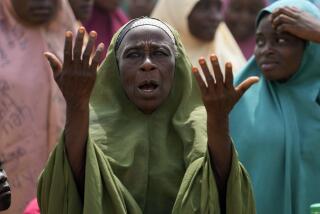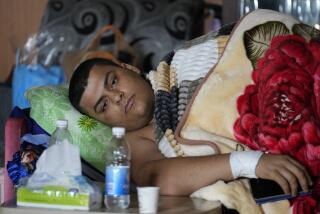Kidnapping in Iraq Leads to Sunni Political Boycott
- Share via
BAGHDAD — Following the abduction a day earlier of a female legislator, the largest Sunni Arab coalition announced a political boycott Sunday, as another lawmaker dodged a kidnapping attempt and a third politician survived an assassination try.
Shiite Muslim lawmaker Liqa Yaseen and her driver managed to escape kidnappers who tried to abduct her south of Baghdad, though eight of her bodyguards were taken captive, authorities said.
In the capital, Iyad Jamaluddin, a legislator from the secular Iraqiya slate, was driving to parliament when a car bomb hit his convoy. Jamaluddin escaped unharmed, but some of his bodyguards were injured in the blast, he told Al Arabiya satellite channel.
The boycott and the apparent targeting of both Sunni and Shiite politicians come at a sensitive time for Iraqi Prime Minister Nouri Maliki, whose government has sought to end sectarian bloodshed through increased security measures in Baghdad and diplomacy around the region.
However, ubiquitous checkpoints and additional security forces on the streets of the capital have failed to prevent assassinations and kidnappings that are nearly everyday occurrences in and around Baghdad. Maliki, a Shiite, was criticized for beginning a tour of the Mideast to shore up support among Sunni Arabs on Saturday -- the same day a car bombing killed at least 77 people in a poor Shiite neighborhood in Baghdad.
On Saturday, kidnappers abducted Sunni lawmaker Taiseer Mashhadani and several bodyguards at a checkpoint in a Shiite neighborhood of Baghdad.
“We have decided, after careful consideration, to suspend participation” in parliamentary sessions “until her release,” said Adnan Dulaimi, head of the Iraqi Accordance Front, the largest Sunni Arab bloc. Dulaimi charged that the Iraqi government and U.S. troops were allowing criminal gangs to freely roam the streets of Baghdad “as if they are the government itself,” adding that Mashhadani and her bodyguards were abducted in an area rife with police.
“We demand that the government and the American forces spare no efforts to find her,” he said. “She is a woman. We have the responsibility to protect her.”
The Muslim Scholars Assn., another influential Sunni group, meanwhile, condemned a group of American soldiers accused of raping an Iraqi woman and then killing her, along with her mother, father and younger sister. “The rape, mutilation and killing committed by the occupation forces are crimes that shame humanity and disgrace the
The U.S. military recently began an investigation after two American soldiers came forward with information about the deaths March 12 in Mahmoudiya, a village about 20 miles south of Baghdad. A U.S. military official said investigators believed that the assault was premeditated and that soldiers watched the family for a week before committing the crimes, which are punishable by death.
Muayed Fadil, mayor of the area around Mahmoudiya, on Sunday said a medical examination of the victims showed that bullets had crushed the head of the father, Kasim Hamza Rasheed. His wife, Fakhriya Taha Muhsen, had been shot several times, as had Hadel Kasim, the younger daughter. Abeer Kasim Hamza, the older daughter, had been shot in the head and had burn marks on her body, according to medical records, Fadil said. Military investigators are trying to determine whether the attackers tried to burn the body to conceal the crime.
Iraqi doctors had examined the bodies in March so they could issue death certificates in accordance with Iraqi law.
Mahmoudiya is in an insurgent stronghold known as the “Triangle of Death.” Last month, two U.S. Army soldiers were abducted, tortured and killed nearby. The four soldiers under investigation were from the same unit: the 502nd Infantry Regiment, which is attached to the 4th Infantry Division.
On Sunday night, eight Iraqis were killed and 22 others injured in the village when a car bomb exploded in a market. Shortly after, the market was shelled with mortar rounds, authorities said.
Three other bombs killed four people and injured 18 in separate attacks in Baghdad. In several neighborhoods, rebels clashed with soldiers and police, authorities said.
In the mixed Jihad neighborhood in western Baghdad, gunmen fought into the night in the streets near a Sunni mosque. In the last few weeks, problems have brewed in the area, which is also home to a Shiite mosque. One resident said the violence began with sectarian killings and abductions.
Police entered the Noor Sunni mosque at 1:30 a.m. Sunday, and people inside fought back, destroying several police vehicles with rocket-propelled grenades, according to authorities. A suicide bomber, apparently sent to blow himself up among the officers, failed to detonate explosives strapped to his waist. However, he managed to detonate a hand grenade, injuring himself and eight officers, police said. The bomber and his victims were brought to the same hospital, Iraqi officials said.
Near the northern city of Kirkuk, a suicide car bomber attacked police on the highway to Tikrit, killing one officer and injuring two, authorities said.
In a news conference in Baghdad, meanwhile, Iraqi national security advisor Mowaffak Rubaie released a list of the 40 most-wanted people in Iraq, including Saddam Hussein’s wife Sajida Khairallah Telfah, believed to be living in Qatar, and his eldest daughter, Raghad, believed to be living in Jordan. Izzat Ibrahim, a high-ranking officer during Hussein’s reign, was at the top of the list.
Rubaie also told the Associated Press that Al Qaeda in Iraq leader Abu Musab Zarqawi had been buried in a secret grave in Baghdad. He was killed last month by an American airstrike.
*
Times staff writers Raheem Salman, Saif Hameed and Saif Rasheed contributed to this report.
More to Read
Sign up for Essential California
The most important California stories and recommendations in your inbox every morning.
You may occasionally receive promotional content from the Los Angeles Times.













